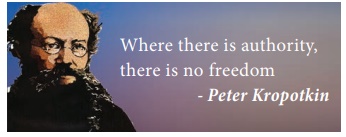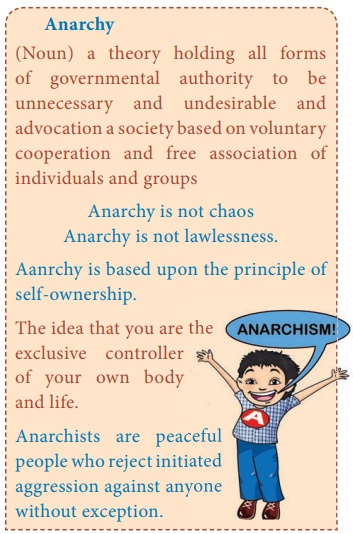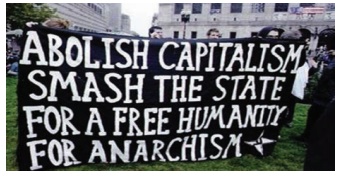Political Ideologies - Anarchism | 11th Political Science : Chapter 8 : Political Ideologies - Part-II
Chapter: 11th Political Science : Chapter 8 : Political Ideologies - Part-II
Anarchism
Anarchism
Anarchism is a political ideology that advocates the model of
self-governed societies based on innate cooperative instincts of man.
Etymologically, anarchism is derived from the Greek word 'anarchos' meaning
'without authority'. One of the earliest political philosophers of anarchism
was Pierre Joseph Proudhon who famously described profit as theft.

Russian thinker Peter Kropotkin and Russian author Leo Tolstoy are among
the other important advocates of this philosophy.
Anarchism as an ideology seeks to abolish all authority and emancipate
man from the State, property and religion. It alternatively visualizes a
society based on voluntary association of human beings.
Anarchism considers the State as an unnecessary evil. State is an evil
because it suppresses rights and liberties of man hindering his moral
development. Unlike the negative liberalists who called the State necessary
even though it is an evil, anarchism rejects the State as an unnecessary
institution. They argue that the state does not perform any useful function in
society and, therefore, it must be exterminated immediately. Bakunin, another
famous anarchist thinker asserted that if there is a State, there must be domination
and subjugation of one class by another class and therefore all States must
vanish.

Anarchism does not champion the cause of disorder and disunity. On the
contrary, it claims to embody order and unity. Human beings are naturally
provided with cooperative instincts. They can lead a life of happiness and
fulfilment guided by the instinct of voluntary cooperation. But the artificial
institution of the State suppresses the cooperative instincts of man. It
endangers freedom and rights of man. Anarchism aspires to destroy the State and
implant in its place a new system of voluntary associations. Every man will
voluntarily and enthusiastically participate in public life. Anarchy does not
mean a society without rules, rather without rulers.
Anarchism believes in the principles of self -determination and
self-ownership. Every human being has the right to self-determination and can
decide his or her life based on his wishes and freedom. Similarly, every person
has complete ownership of himself or herself and this is the most basic form of
property. The State threatens these two important principles and therefore
should be discarded.
Anarchism opposes not only State but also other social institutions like
family and religion criticizing them to be responsible for the abominable
exploitation of man. Some anarchists equate property with tyranny and condemn
it as source of crime.
Anarchism is similar to Marxism in demanding the abolition of the State.
But while Marxism believes that the State will wither away after the
establishment of socialism, anarchism demands the immediate destruction of the
State.

Gerard Casey supported anarchism in the 21st century by stating that not
only the totalitarian and repressive ones all States are criminal organizations.
A new system of Stateless societies is the cherished goal of anarchism.
There are different kinds of anarchism. They can be categorised as
philosophical anarchism, socialist anarchism, revolutionary anarchism and
libertarian anarchism. However, not all of them demand the abolition of the
State. The libertarian anarchism wants to restrict the State to the minimum
possible extent. Still, a majority of anarchist philosophers advocate the
abolition of the State.
Philosophers, critical of anarchism, opined that anarchism is too
optimistic of the human nature. Their assumptions are plainly naive. They are
oblivious to the ground realities especially the selfish side of human beings.
Not all human beings are instinctively cooperative. Moreover, as man is not
only rational but also emotional at times strongly influenced by emotions a
cooperative individual may become selfish. A world or society without the State
will prove to be a source of immense misery as issues like terrorism,
cybercrime, and environmental pollution will spiral out of control. The safety
of the world becomes fragile in the absence of the State as extremist groups
will gain access and control over nuclear weapons and herald death and
destruction.
Related Topics